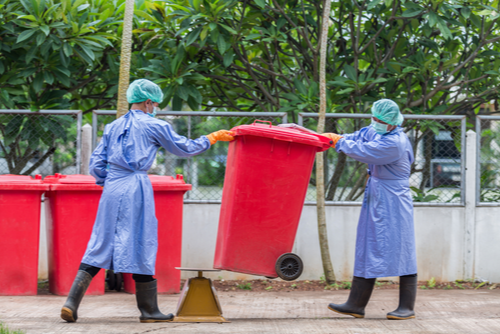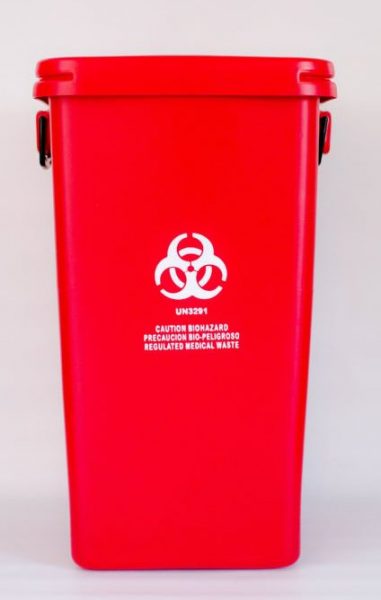Defending Well-Being: Unveiling the Significance of Specialist Medical Waste Removal
Wiki Article
Keep Ahead of Laws: Specialist Guidance on Medical Waste Disposal
In a globe where the medical care market is regularly progressing, it is imperative for clinical centers to remain ahead of regulations when it comes to the proper disposal of medical waste. From comprehending the different categories of clinical waste to applying the ideal collection and segregation techniques, this conversation will certainly offer actionable tips and useful insights to aid facilities remain ahead of guidelines in the ever-changing landscape of clinical waste disposal.Recognizing Medical Waste Categories
Recognizing clinical waste categories is important for proper disposal and monitoring in medical care centers. Medical waste describes any kind of waste created by medical care activities that might pose a danger to public health or the atmosphere. It is essential to categorize medical waste properly to guarantee its secure handling, therapy, disposal, and transport.There are numerous categories of medical waste that healthcare facilities require to be acquainted with. The most common classifications include infectious waste, pathological waste, sharps waste, pharmaceutical waste, and chemical waste. Each classification has details guidelines and policies for its proper management and disposal.
Contagious waste consists of products infected with blood or various other physical fluids, such as handwear covers, gowns, and research laboratory cultures. Pathological waste describes human cells, organs, or body parts that call for special delivery and disposal. Sharps waste includes used needles, syringes, and various other sharp items that can create injury and send infections. Drug waste makes up ended, unused, or contaminated medications that need careful handling and disposal. Chemical waste consists of solvents, anti-bacterials, and various other chemical substances utilized in medical care facilities.
Staying Up-To-Date With Regulatory Changes
Staying existing with regulatory changes is important for health care centers to make sure conformity and proper monitoring of medical garbage disposal. medical waste removal near me. With policies frequently advancing, it is important for medical care centers to stay updated to prevent penalties, penalties, and potential damage to the atmosphere and public wellnessTo remain in advance of regulative adjustments, healthcare facilities must develop a system for tracking and monitoring updates. This can be done by registering for regulative newsletters, going to workshops and meetings, and proactively taking part in sector organizations. Furthermore, centers ought to designate a team participant or team in charge of remaining notified and disseminating info to appropriate stakeholders.
Normal interaction with governing agencies is likewise vital. Health care centers must establish connections with neighborhood, state, and government companies to ensure they know any type of adjustments in guidelines that might affect their waste monitoring practices. This can be done through routine meetings, involvement in public remark periods, and positive interaction with regulative agencies.
Furthermore, health care centers must consider partnering with waste management firms that focus on clinical garbage disposal (medical waste disposal services with WasteX). These firms are frequently fluent in the most recent guidelines and can supply guidance and assistance to make sure compliance
Executing Correct Collection and Segregation Methods
To properly handle clinical waste disposal, health care centers have to develop correct collection and partition methods according to regulative guidelines. Applying these techniques makes certain the secure handling and disposal of potentially harmful products, shields the atmosphere, and reduces the danger of injuries and infections to health care employees and the public.
Correct collection and segregation techniques include using assigned containers and labeling systems. Medical care facilities should offer clearly labeled containers for various sorts of clinical waste, such as sharps, transmittable waste, pharmaceutical waste, and non-hazardous waste. These containers should be color-coded and clearly significant to prevent complication and promote simple identification.
Furthermore, medical care facilities ought to train their staff on the right treatments for gathering and segregating medical waste. This consists of enlightening them on the various sorts of waste, the ideal containers to utilize, and the significance of following standards and guidelines. Regular training sessions and refresher programs ought to be carried out to ensure that team member stay current on finest techniques.
Furthermore, healthcare centers should a fantastic read develop a system for regular collection and disposal of medical waste. This may entail partnering with licensed waste monitoring companies that focus on clinical waste disposal. These companies will make sure that the gathered waste is delivered and thrown away in compliance with governing requirements.
Picking the Right Disposal Techniques

Incineration is just one of one of the most common and effective approaches for dealing with particular sorts of medical waste, such as pathological waste and sharps. It entails the regulated burning of waste at heats, lowering it to ash. Incineration can launch damaging toxins into the air and add to air pollution.

Chemical therapy includes the usage of chemicals to disinfect and neutralize the waste. Microwave treatment utilizes microwave power to warm and decontaminate the waste.
Ensuring Compliance With Documents and Training
After meticulously considering the ideal disposal methods for clinical waste, medical care centers have to ensure compliance with policies and reduce environmental influence by carrying out effective documentation and training procedures. This action is important in keeping a safe and sustainable atmosphere for both health care workers and the basic public.
Training is equally vital in ensuring conformity with laws. Health care employees who take care of clinical waste must receive proper training on waste partition, taking care of, and disposal website here procedures. This training must cover subjects such as the proper use individual protective devices, identification of different kinds of waste, and the proper disposal approaches for each waste category. By offering detailed training, medical care facilities can empower their staff to make enlightened choices and decrease the danger of inappropriate garbage disposal.
Final Thought
To conclude, remaining ahead of guidelines in medical garbage disposal is important for health care facilities. medical waste removal services. Recognizing the different groups of clinical waste, navigate to these guys remaining upgraded with governing changes, carrying out correct collection and segregation approaches, picking the appropriate disposal approaches, and ensuring compliance with documentation and training are all vital steps. By adhering to these guidelines, medical care companies can properly get rid of and handle of medical waste in a secure and liable fashionFrom understanding the various groups of clinical waste to carrying out the best collection and partition methods, this discussion will give valuable understandings and workable pointers to help centers remain ahead of policies in the ever-changing landscape of clinical waste disposal. - medical waste disposal services with WasteX
The most typical groups consist of transmittable waste, pathological waste, sharps waste, pharmaceutical waste, and chemical waste. Medical care centers need to supply plainly classified containers for various types of medical waste, such as sharps, contagious waste, pharmaceutical waste, and non-hazardous waste. Medical care facilities ought to establish a thorough system to tape-record and track all elements of medical waste disposal, including kinds of waste generated, amounts, and disposal methods utilized. Medical care employees who manage medical waste ought to obtain proper training on waste partition, handling, and disposal treatments.
Report this wiki page